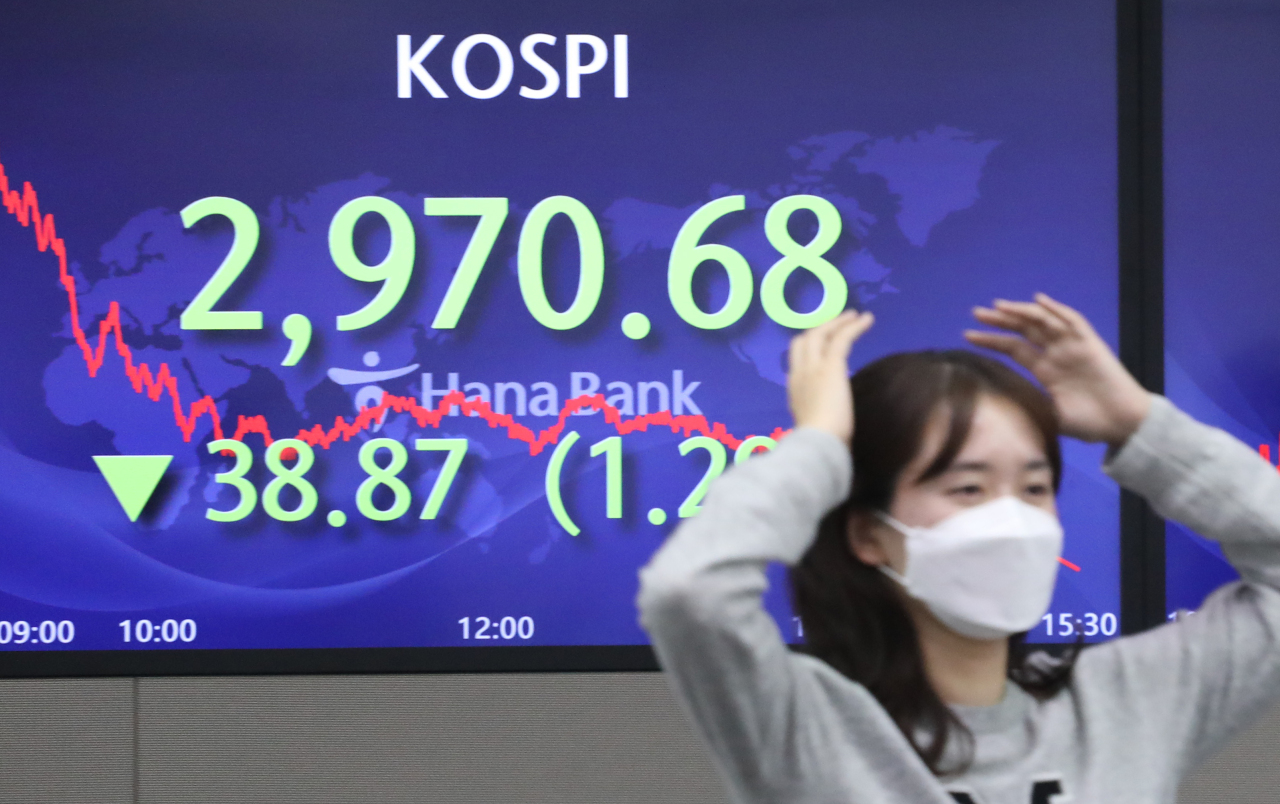 |
An electronic board displays the closing mark of South Korea’s benchmark Kospi at Hana Bank headquarters in Seoul, Friday. (Yonhap) |
South Korea’s main stock market saw its trading volume hit its lowest level in a year this month, data showed Sunday, amid market instability ahead of monetary policy meetings at central banks here and in the United States.
The Kospi’s daily average trading volume stood at 11.75 trillion won ($10 billion) in October, its lowest level since the 10.85 trillion won posted a year ago, according to data compiled by the Korea Exchange.
The figure had nearly halved since January, when it reached 26.48 trillion won as the benchmark index surged past 3,000 points for the first time. As of Oct. 22, the daily average trading volume on the main bourse had reached 9.05 trillion won, plunging below the 10 trillion won mark for the first time since Nov. 2 last year, when it hit 8.51 trillion won.
Kospi transaction amounts and the movements of the main bourse are closely linked together, according to market observers. Meanwhile, the benchmark index closed at 2,970.68 points on Friday, losing 3.2 percent this month.
The ratio of turnover to market capitalization also dropped to this year’s second-lowest monthly level. October’s average monthly turnover came to 10.29 percent, while January’s figure marked the lowest monthly level of 8.69 percent, the data showed.
The sharp decreases were largely attributable to the slumping key index, coupled with inflation concerns and central banks’ moves toward monetary tightening, fanning anxiety among investors, analysts said. Investors are paying keen attention to upcoming big events that could affect the local stock market, they added.
Market experts expect the US Federal Reserve to announce a plan to taper its asset purchases during its Nov. 2-3 meeting. The actual tapering would begin in mid-November or mid-December.
The tapering exercise is likely to have more of an effect on emerging-market stocks in the short term, but the impact will be limited while the news value has already been baked into markets, they forecast.
“Amid a slower third-quarter economic growth of the US, the tapering exercise could momentarily drop confidence in stock markets,” NH Investment & Securities analyst Kim Young-hwan said. “But since it is not a policy that would withdraw liquidity, the event won’t be an unfavorable external factor in the long term.”
The Bank of Korea is also expected to raise its interest rate to 1 percent from 0.75 percent at its Nov. 25 policy meeting to cope with concerns over a financial imbalance related to economic recovery. Yet uncertainties surrounding next year’s rate hike plan could increase the burden on the local stock market, according to some analysts.
“The (Bank of Korea’s) rate hike plan has been certain but forecasting the timeline for the next rate increases and level of hikes remains unclear. ... Based on the BOK’s November rate-setting meeting result, the market will try to find clues on future monetary policy,” said Kim Sung-soo, an analyst at Hanwha Investment & Securities.
By Jie Ye-eun (
yeeun@heraldcorp.com)








